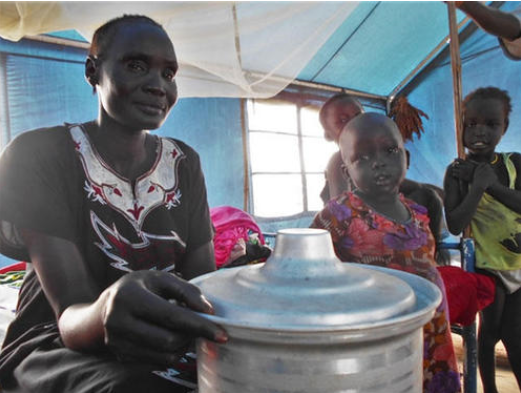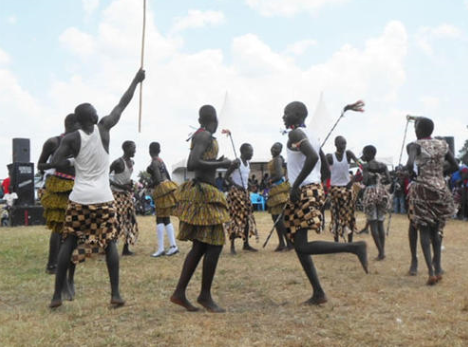– Hearing in the Mangaten domestic refugee camp –
[Original by Takaki IMAI Manager for Humanitarian Assistance and Peace-Building Group (December 6, 2017); Translated by K. Adachi]
I went to Juba in South Sudan on November 23, 2017, listened to the internally displaced people in refugee camps, and gave medical and educational aid. I will report the local situations and our activities in this series, “The Diary from South Sudan.”
In this post, I report the activities on the 3rd and the 5th day of the stay (the 4th day is skipped because it was a Sunday).
The 3rd day: 25th of November (Saturday)
At the Mangaten domestic refugee Camp 1
The Mangaten domestic refugee camps consist of Camp 1 and Camp 2, which are located hundreds of meters away each other. I visited Camp 1 today.
The vacant land seems to have decreased, and the number of tents increased from the last time. One could see the assembly of new timber structures for tents.
Because Mr. Peter, the leader of Camp 1, was absent, I met Mr. Marikan, the next in charge, and I explained the purpose of my visit: I both wanted to know whether the pots and mosquito nets provided in August had been utilized, and I wanted to ask about schools’ plans supporting their students. During this time, Mr. Marikan brought three teachers from the elementary school in the camp to speak with me. The elementary school in the camp was established by DMI (Daughters of Mary Immaculate), a missionary human relief organization; the school is therefore called “The DMI elementary school.” Although I heard about the elementary school on my previous visit, I discovered the following on my visit:
- The DMI elementary school has 4 classes in total consisting of 1 kindergarten class and 3 elementary classes, ranging from the 1st to 3rd grade. There are 220 children in all, with about 70 children in kindergarten and about 50 children in each remaining class.
- Some children go to external elementary schools outside of the camps, and the annual school fee for these external schools is approximately 12,000 SSP (South Sudanese Pounds), roughly 60 US dollars, which is expensive. On the other hand, DMI elementary school does not charge any school fee.
- In terms of supplies, DMI elementary school is only able to distribute one notebook per child.
- Each school year ends on the 15th of December and resumes on the 15th of January. In the coming semester, the classes for 4th and 5th grade are planned to open.
After that, I visited 5 tents with Mr. Marikan and teachers. We conducted hearings with six mothers confirming the use of supplies (i.e., pots, mosquito nets, soaps) distributed in August and children’s school attendance.
Regarding the distributed supplies, half of mothers answered they received all three kinds of supplies. They showed the mosquito nets hung about the room, and they brought pots from the kitchen for display. For the remaining cases, some people only received pots because they had not been in the camps at the day of distribution. Others received nothing at all because either because 1) they were new-arrivals to the camp and had not been on the name lists for distributions, or 2) they lived in the same tent with several families and thereby did not receive individual allocations of supplies.
The rate of school attendance was higher than what we initially predicted. Most children in the families we visited were going to schools. I accredit this to DMI elementary school, which imposes no school fee. However, there is still a financial barrier since families must purchase school supplies such as notebooks and pencils. This is a particularly difficult for mothers who barely have any cash income. One mother grumbled, “I had no other choice but to seek some pieces of papers and give them to my children when they asked me to buy notebooks. I had no money.” When we asked the elementary school teachers, they said:
“Most of children come to the school with nothing – many not even bringing notebooks. This makes it impossible to teach them. Although we told them to ask their parents to buy notebooks, it is hard for refugee families. Instead, teachers hand over papers and let children use them instead of notebooks in the classroom.”
Among the tents we visited, there was a mother who had her child to go to the ordinary public school outside the camp. Because she sends her child to an external school, she has to pay the school fee. She asks her relatives to provide the money because she cannot afford it by herself. From this visit, we are planning to support school supplies, such as notebooks, to the children in the camp.
When we were leaving, we were stopped by a group of young people gathered and conversing in the shade of trees in the camp. As we were talking about our activities, this youth assembly requested that we “give sanitary goods to female students as one of the supports.” In many cases, female students are unable to attend school or stop going to school altogether because they don’t have sanitary goods. Although we recognized that women might be reticent to make this request themselves, we were surprised and intrigued to hear this from the youth assembly, basically comprised of young men. We feel it is necessary to consider this request.
Price quotation of medical supplies
We obtained the unit price quotation from three medical supply retailers based on the list of medical supplies we received from the Gumbo clinic. We are going to consult with Doctor Remo and consider the quantity based on his response.
The 5th day: 27th November (Monday)
Participation in the event, “16 Days of Activism,” in the Gumbo refugee camp
We took part in the kick-off event of the 16 days campaign, which spans from the end of November to the beginning of December and is globally sponsored by the UN and NGOs. The theme is “Stop Gender Based Violence.”
The venue is the Gumbo refugee camp, situated on the side of the Nile River opposite from the city of Juba, where the Japan Center for Conflict Prevention (JCCP) has been conducting its continuous support activities. This is the same place that JVC used to provide food supplies in September 2016. At the time of the event, established by JCCP, refugees from Gumbo and other two camps adjacent to Juba came by bus to take part in the event.
It was a fun event celebrating traditional dances, songs, and performances. The performance by students with the theme of “Gender Based Violence” was particularly noteworthy among the festivities.
Investigation regarding the price of school supplies
I came out from the event and investigated the price of school supplies (notebooks, pencils, school bags, etc.…) around the Konyo Konyo market. Based on these prices, we are either going to adjust the relief items or the number of school children who are subject to the support.
When I came back to the hotel that day, I received SMS from the cellphone company. I thought it was advertising as usual, but it wasn’t. The text read:
“Stop gender based violence. Real men don’t beat women.”
The cellphone company appears to cooperate with the campaign by the United Nations and NGOs.
Next time, I will report on the visit to the Mangaten domestic refugees Camp 2 and the status of medical supplies to the Gumbo clinic.
Share This:

